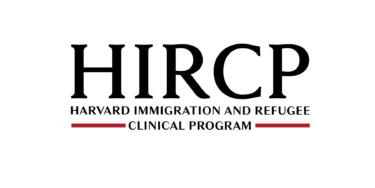Dilapidated storefronts line the main street of the little-known border town of Dilley, Texas. The flat, tortilla colored landscape features scattered billboards for the disproportionate number of sprawling gas stations and empty motels in the area, vestiges of an oil boom in the 1980s. Now, the forgotten space is home to the South Texas Family Residential Center, the largest family detention center in the United States. The facility, comprised of dozens of disordered tan trailers, sits on a vast plot of land near Dilley town limits, behind a field of light poles and an intimidating chain-link fence.
Moved by my summer internship at the Harvard Immigration and Refugee Clinic (HIRC) and Professor Deborah Anker’s Immigration Policy and Social Change course, I chose to volunteer with the CARA Family Detention Pro Bono Project the week before fall semester classes commenced. My friend and fellow HIRC summer intern, Brianna Rennix, also embarked on the trip. Over the course of the week, the Project worked to represent over four hundred detained mothers seeking asylum in the United States. The vast majority of clients trekked from the Northern Triangle of Central America fleeing traumatic violence, rampant impunity, and pervasive gender discrimination. The almost universal description of a long and arduous journey to the United States speaks to the urgency of circumstances at home and the amount riding on these asylum claims.
In contrast to the traditional model of pro bono work where lawyers represent a single client from a case’s start to finish, Catholic Legal Immigration Network, the American Immigration Council, the Refugee Immigrant Center for Education and Legal Services, and American Immigration Lawyers Association have pooled resources to effectuate a new structure of direct representation. Propelled by a semi-permanent on-the-ground staff and a comprehensive database regularly updated by off-site volunteers across the country, short-term volunteer teams commit to one-week shifts at the South Texas Family Residential Center. Rather than being assigned to individual clients, volunteers serve as free agents to tackle client issues as they present themselves. One member of my volunteer cohort aptly analogized the Project’s operation to an emergency room for legal services.
Even as a short-term volunteer, I was tasked with emotionally draining, hands-on duties, laden with responsibility that carried life-or-death consequences. While infants restlessly stirred on their mothers’ laps and curiously crawled around the floor of the Project’s trailer, I fielded questions on the parameters of the law’s “past persecution” language and explained the wooly concept of nexus in layman’s terms. The purpose of these conversations is to prepare clients for their credible fear interviews, highlighting what questions will be asked what parts of their personal narratives are most relevant to the asylum determination.
The credible fear interview is designed to discern which applicants have recognizable asylum cases that warrant entering the United States. A positive determination is issued if the asylum officer finds that there is a “significant possibility” that the asylum case will succeed in a full merits hearing. (INA §235(b)(1)(A); 8 C.F.R. §208.30.) Receiving a positive determination triggers an asylum applicant’s release from detention.
The day before each client’s credible fear interview, the Project schedules an individual consultation for the family. In these meetings, volunteers provided a forum for mothers to practice telling their stories. Many had no difficulty capturing the raw fear of being forcibly returned to their home countries, but others understandably struggled to open up and reveal deeply troubling personal information. Our role as advocates was to delicately extract those pertinent, sensitive pieces of testimony.
Immigration and Customs Enforcement (ICE) officers declare the detention center successful, resting their laurels on the few complaints from detainees. They point to the fact that the percentage of women who receive positive determinations is over 95%, and that the majority of women need not languish behind South Texas Family Residential Center’s fences for longer than 21 days. Complaints about inadequacy of medical treatment, childcare, and food have not been frequent at Dilley. However, it is critical to recognize that this seeming humanitarian triumph is not a product of the system as implemented by ICE. If it were not for volunteer watchdog groups and their commitment to asylum applicants’ due process rights, the reality would be far bleaker. Without the weekly expenditure of tens of thousands of dollars in human capital to preserve the efforts of an organization like the CARA Pro Bono Project, asylum seekers would have virtually no access to legal representation in out-of-sight, out-of-mind Dilley, Texas.
